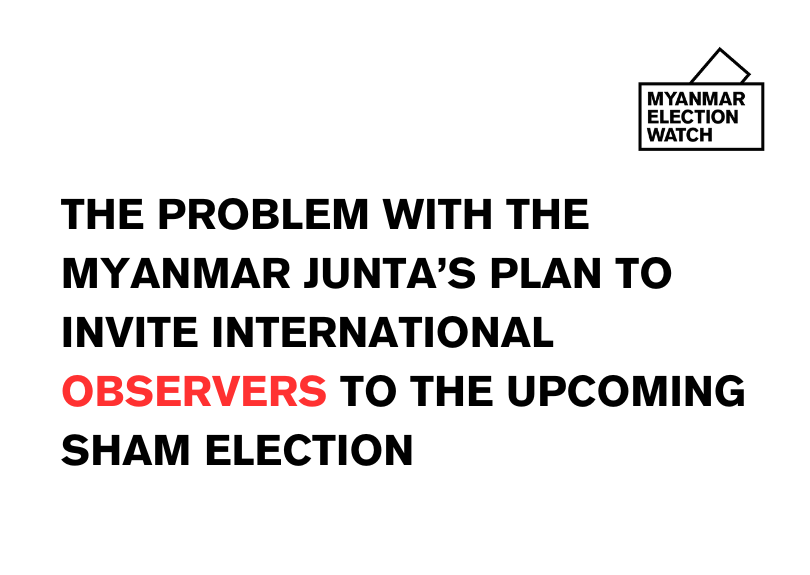Myanmar junta is planning to invite local and international observers to the upcoming sham election, although the exact date of the electoral exercise has not been specified. In this article, we will revisit our blog published in December 2024 to posit that no credible election observer will be present in the sham election.

Back in November 2024, Cambodian People's Party (CPP) agreed to send observers to monitor the Myanmar junta-planned election expected to be organized in 2025.
In a meeting with 53 registered political parties in December 2024, junta-appointed Union Election Commission (UEC) Chair U Ko Ko also assured that UEC will invite local and international observers. A month later, the junta chief Min Aung Hlaing repeated the message during a meeting with Ambassador-designate of the Islamic Republic of Iran to Myanmar Dr Nassereddin Heidari.
The fact that the plan to invite international observers was discussed with representatives from two authoritarian regimes - Cambodia and Iran - highlights a problem with the legitimacy of the Myanmar junta-planned sham election.
While the move is framed as a gesture of support for regional stability, it is the spectre of one authoritarian regime overseeing a fake election for another authoritarian junta.
A military election creates only more instability for Myanmar. Cambodia’s and Iran's support for Min Aung Hlaing’s policy confirms that the military junta wants a one-party poll and nothing more.
Cambodia has been criticized for suppressing opposition and undermining democratic norms. In the 2023 Cambodian general election, Prime Minister Hun Sen's CPP faced no genuine competition, as the only credible opposition party was disqualified on technicalities.
Such actions led to accusations that Cambodia's elections are democratic in name only, designed to maintain the illusion of legitimacy for entrenched autocracy.
Iran is also widely considered an authoritarian regime. While it holds elections and has some formal democratic institutions, its political system is dominated by unelected religious authorities, particularly the Supreme Leader, who holds ultimate power over the government, military, and judiciary.
Similarly, Myanmar's military junta plans to stage an election widely regarded as a sham. It is a desperate effort to regain momentum after ousting the democratically elected government in 2022.
Widespread violence, the repression of dissent, the arrest and execution of elected MPs, and the disenfranchisement of large swathes of the population, underscore the impossibility of a free and fair vote under current conditions.
For Cambodia’s CPP to act as an election monitor for Myanmar is an irony not lost on observers. Regimes that actively dismantle democratic processes cannot credibly oversee an election under a military dictatorship. Such arrangements risk legitimizing authoritarian regimes rather than fostering genuine democratic governance.
By appointing Cambodia as an election monitor, Myanmar’s junta appears more interested in clinging onto power than in engaging in any genuine democracy.
